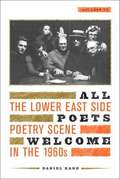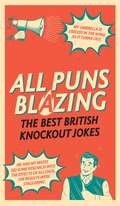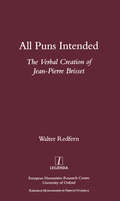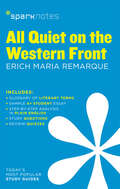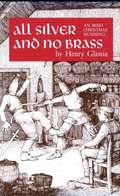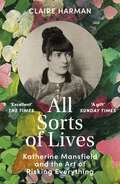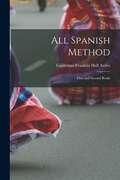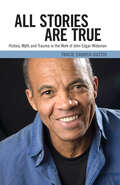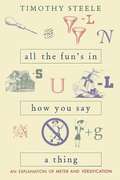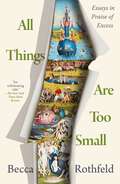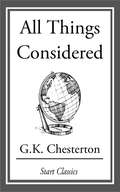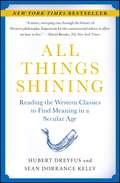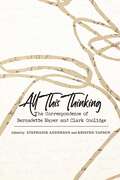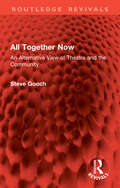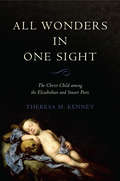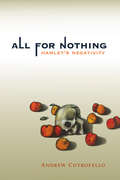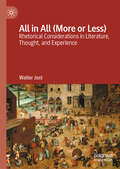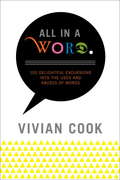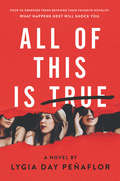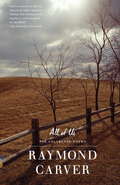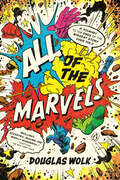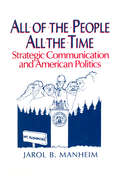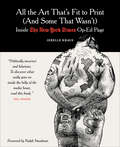- Table View
- List View
All Poets Welcome: The Lower East Side Poetry Scene in the 1960s
by Daniel KaneThis landmark book captures the heady excitement of the vibrant, irreverent poetry scene of New York's Lower East Side in the 1960s. Drawing from personal interviews with many of the participants, from unpublished letters, and from rare sound recordings, Daniel Kane brings together for the first time the people, political events, and poetic roots that coalesced into a highly influential community. From the poetry-reading venues of the early sixties, such as those at the Les Deux MÉgots and Le Metro coffeehouses to The Poetry Project at St. Mark's Church, a vital forum for poets to this day, Kane traces the history of this literary renaissance, showing how it was born from a culture of publicly performed poetry. The Lower East Side in the sixties proved foundational in American verse culture, a defining era for the artistic and political avant-garde. The Lower East Side's cafes, coffeehouses, and salons brought together poets of various aesthetic sensibilities, including writers associated with the so-called New York School, Beats, Black Mountain, Deep Image, San Francisco Renaissance, Umbra, and others. Kane shows that the significance for literary history of this loosely defined community of poets and artists lies in part in its reclaiming an orally centered poetic tradition, adapted specifically to open up the possibilities for an aesthetically daring, playful poetics and a politics of joy and resistance.
All Puns Blazing: The Best British Knockout Jokes
by Geoff RoweI don't like to brag but I can control a kayak brilliantly. Canoe?'Pardon' is the only French word that I know. I can only apologise.From Geoff Rowe and the Leicester Comedy Festival comes this brilliant tribute to that most British of jokes, the humble pun.Including a foreword from Dr Oliver Double and a wealth of hilarious (and occasionally groan-inducing) material from some of Britain's finest stand-up comedic talent, All Puns Blazing is a fun and fitting celebration of grassroots UK comedy.Featuring puns from:El Baldiniho - Lovdev Barpaga - Zahra Barri - Adele Cliff - Tony Cowards - Henry Dawe - Pauline Eyre - Friz Frizzle - Masai Graham - Sean Hegarty - Kevin Hudson - Leo Kearse - Colin Leggo - Nigel Lovell - Iain MacDonald - Kat Molinari - Laura Monmoth - Joseph Murphy - Graham Musk - Sean Patrick - Richard Pulsford - Paul Savage - Philip Simon - Rob Thomas - Andrew Tymms - Stevie Vegas - Chris Norton Walker - Darren Walsh - Richard Woolford - Jenan Younis
All Puns Intended: The Verbal Creation of Jean-Pierre Brisset
by Walter D. Redfern"The 19th century in France spawned numerous 'fous litteraires, one of them being Jean-Pierre Brisset (1837-1919). An individualist among individualists, he dismantled the existing French tongue, reshaping it to suit his own grandiose purposes, which were to explain afresh the development of human beings (from frogs) and of their language (from croaks). Continuous and ubiquitous punning was a unique feature of his writing. In this study, Redfern examines such themes as the nature of literary madness, the phenomenon of deadpan humour, the role of analogy, and the place of institutional religion in Brisset's creative rewriting of the creation."
All Quiet on the Western Front SparkNotes Literature Guide (SparkNotes Literature Guide Series)
by SparkNotesAll Quiet on the Western Front SparkNotes Literature Guide by Erich Maria Remarque Making the reading experience fun! When a paper is due, and dreaded exams loom, here's the lit-crit help students need to succeed! SparkNotes Literature Guides make studying smarter, better, and faster. They provide chapter-by-chapter analysis; explanations of key themes, motifs, and symbols; a review quiz; and essay topics. Lively and accessible, SparkNotes is perfect for late-night studying and paper writing. Includes:An A+ Essay—an actual literary essay written about the Spark-ed book—to show students how a paper should be written.16 pages devoted to writing a literary essay including: a glossary of literary termsStep-by-step tutoring on how to write a literary essayA feature on how not to plagiarize
All Silver and No Brass: An Irish Christmas Mumming
by Henry GlassieOn the folklore and oral history of mumming within a small community in the border area of Ireland and Ulster,this book provides insightful study of Irish folklife, and a fine presentation of mumming's memory culture.
All Sorts of Lives: Katherine Mansfield and the art of risking everything
by Claire Harman** The Sunday Times Best Literary Book of 2023**** A Waterstones Best Book of 2023**'All Sorts of Lives is a beautiful, fastidiously researched and fascinating exploration of Mansfield's life and work' A.L. KENNEDYRestless outsider, masher-up of form and convention, Katherine Mansfield’s career was short but dazzling. She was the only writer Virginia Woolf admitted being jealous of, yet by the 1950s was so undervalued that Elizabeth Bowen was moved to ask, 'Where is she – our missing contemporary?'In this inventive and intimate study, Claire Harman takes a fresh look at Mansfield’s life and achievements, through the form she did so much to revolutionise: the short story. Exploring ten pivotal works, we watch how Mansfield’s desire to grow as a writer pushed her art into unknown territory, and how illness sharpened her extraordinary vitality: ‘Would you not like to try all sorts of lives – one is so very small.’‘What a gift to the biographer, this life of adventure and sickness and sex and celebrity… Brilliant’ Sunday Times‘A searching, incisive and compulsive book. A lesson in how to read and connect and understand’ Sunjeev Sahota
All Spanish Method First and Second Books (Spanish Edition)
by Guillermo Franklin Hall AvilesAll Spanish Method, Book 1 & 2. A book to learn Spanish.
All Stories Are True: History, Myth, and Trauma in the Work of John Edgar Wideman (Margaret Walker Alexander Series in African American Studies)
by Tracie Church GuzzioIn All Stories Are True, Tracie Church Guzzio provides the first full-length study of John Edgar Wideman's entire oeuvre to date. Specifically, Guzzio examines the ways in which Wideman (b. 1941) engages with three crucial themes—history, myth, and trauma—throughout his career, showing how they intertwine. Guzzio argues that, for four decades, the influential African American writer has endeavored to create a version of the African American experience that runs counter to mainstream interpretations, using history and myth to confront and then heal the trauma caused by slavery and racism. Wideman's work intentionally blurs boundaries between fiction and autobiography, myth and history, particularly as that history relates to African American experience in his hometown of Pittsburgh, Pennsylvania. The fusion of fiction, national history, and Wideman's personal life is characteristic of his style, which—due to its complexity and smudging of genre distinctions—has presented analytic difficulties for literary scholars. Despite winning the PEN/Faulkner award twice, for Sent for You Yesterday (1984) and Philadelphia Fire (1990), Wideman remains under-studied. Of particular value is Guzzio's analysis of the many ways in which Wideman alludes to his previous works. This intertextuality allows Wideman to engage his books in direct, intentional dialogue with each other through repeated characters, images, folktales, and songs. In Wideman's challenging of a monolithic view of history and presenting alternative perspectives to it, and his allowing past, present, and future time to remain fluid in the narratives, Guzzio finds an author firm in his notion that all stories and all perspectives have merit.
All The Fun's In How You Say A Thing: An Explanation Of Meter And Versification
by Timothy SteelePerfect for the general reader of poetry, students and teachers of literature, and aspiring poets, All the Fun’s in How You Say a Thing is a lively and comprehensive study of versification by one of our best contemporary practitioners of traditional poetic forms. Emphasizing both the coherence and the diversity of English metrical practice from Chaucer’s time to ours, Timothy Steele explains how poets harmonize the fixed units of meter with the variable flow of idiomatic speech. He examines the ways in which poets have used meter, rhyme, and stanza to communicate and enhance meaning. Steele illuminates as well many practical, theoretical, and historical issues in English prosody, without ever losing sight of the fundamental pleasures, beauties, and insights that fine poems offer us. Written lucidly, with a generous selection of helpful scansions and explanations of the metrical effects of the great poets of the English language, All the Fun’s in How You Say a Thing is not only a valuable handbook on technique; it is also a wide-ranging study of English verse and a mine of entertaining information for anyone wishing more fully to write, enjoy, understand, or teach poetry.
All Things Are Too Small: Essays in Praise of Excess
by Becca RothfeldA glorious call to throw off restraint and balance in favor of excess, abandon, and disproportion, in essays ranging from such topics as mindfulness, decluttering, David Cronenberg, and consent.In her debut essay collection, “brilliant and stylish” (The Washington Post) critic Becca Rothfeld takes on one of the most sacred cows of our time: the demand that we apply the virtues of equality and democracy to culture and aesthetics. The result is a culture that is flattened and sanitized, purged of ugliness, excess, and provocation.Our embrace of minimalism has left us spiritually impoverished. We see it in our homes, where we bring in Marie Kondo to rid them of their idiosyncrasies and darknesses. We take up mindfulness to do the same thing to our heads, emptying them of the musings, thoughts, and obsessions that make us who we are. In the bedroom, a new wave of puritanism has drained sex of its unpredictability and therefore true eroticism. In our fictions, the quest for balance has given us protagonists who aspire only to excise their appetites. We have flipped our values, Rothfeld argues: while the gap between rich and poor yawns hideously wide, we strive to compensate with egalitarianism in art, erotics, and taste, where it does not belong and where it quashes wild experiments and exuberance.Lush, provocative, and bitingly funny, All Things Are Too Small is a subversive soul cry to restore imbalance, obsession, gluttony, and ravishment to all domains of our lives.
All Things Considered
by G. K. ChestertonA collection of essays dealing with various topics, such as human nature, current affairs, science and religion
All Things Shining: Reading the Western Classics to Find Meaning in a Secular Age
by Hubert Dreyfus Sean Dorrance KellyIn unrelenting flow of choices confronts us at nearly every moment of our lives, and yet our culture offers us no clear way to choose. This predicament seems inevitable, but in fact it's quite new. In medieval Europe, God's calling was a grounding force. In ancient Greece, a whole pantheon of shining gods stood ready to draw an appropriate action out of you. Like an athlete in "the zone," you were called to a harmonious attunement with the world, so absorbed in it that you couldn't make a "wrong" choice. If our culture no longer takes for granted a belief in God, can we nevertheless get in touch with the Homeric moods of wonder and gratitude, and be guided by the meanings they reveal? All Things Shining says we can.Hubert Dreyfus and Sean Dorrance Kelly illuminate some of the greatest works of the West to reveal how we have lost our passionate engagement with and responsiveness to the world. Their journey takes us from the wonder and openness of Homer's polytheism to the monotheism of Dante; from the autonomy of Kant to the multiple worlds of Melville; and, finally, to the spiritual difficulties evoked by modern authors such as David Foster Wallace and Elizabeth Gilbert.Dreyfus, a philosopher at the University of California, Berkeley, for forty years, is an original thinker who finds in the classic texts of our culture a new relevance for people's everyday lives. His lively, thought-provoking lectures have earned him a podcast audience that often reaches the iTunesU Top 40. Kelly, chair of the philosophy department at Harvard University, is an eloquent new voice whose sensitivity to the sadness of the culture--and to what remains of the wonder and gratitude that could chase it away--captures a generation adrift.Re-envisioning modern spiritual life through their examination of literature, philosophy, and religious testimony, Dreyfus and Kelly unearth ancient sources of meaning, and teach us how to rediscover the sacred, shining things that surround us every day. This book will change the way we understand our culture, our history, our sacred practices, and ourselves. It offers a new--and very old--way to celebrate and be grateful for our existence in the modern world.
All This Thinking: The Correspondence of Bernadette Mayer and Clark Coolidge (Recencies Series: Research and Recovery in Twentieth-Century American Poetics)
by Stephanie Anderson and Kristen TapsonAll This Thinking explores the deep friendship and the critical and creative thinking between Bernadette Mayer and Clark Coolidge, focusing on an intense three-year period in their three decades of correspondence. These fiercely independent American avant-garde poets have influenced and shaped poets and poetic movements by looking for radical poetics in the everyday. This collection of letters provides insight into the poetic scenes that followed World War II while showcasing the artistic practices of Mayer and Coolidge themselves. A fascinating look at both the poets and the world surrounding them, All This Thinking will appeal to all readers interested in post–World War II poetry.
All Together Now: An Alternative View of Theatre and the Community (Routledge Revivals)
by Steve GoochIn All Together Now (first published in 1984), Steve Gooch, himself a playwright with extensive experience of ‘community theatre’, looks at the relationship of the theatre to the community in which it takes place. Taking the work of contemporary ‘community theatre’ as a stimulus, he gives a ‘behind-the-scenes’ analysis of the failure of commercial theatre—in the subsidised sector as well as the West End—to transcend the mechanisms of box-office and tradition, and to play a vital and integral part in the life of its audience. Examining the initiatives of small theatres and touring companies in the seventies, Gooch looks critically at their work practices and forms of organisation and draws some positive pointers for the future.As much about the internal workings of theatre production as about the content and outward face of its shows, All Together Now offers new insights into a culture divided between ‘high and low’, ‘popular and serious’.
All Wonders in One Sight: The Christ Child among the Elizabethan and Stuart Poets
by Theresa M. KenneyIn the seventeenth century many leading poets wrote poems about Christ’s infancy, though charm and sweetness were not the leading note. Because these poets were university-educated classicists – many of them also Catholic or Anglican priests – they wrote in an elevated style, with elevated language, and their concerns were deeply theological as well as poetic. In an age of religious controversy, their poems had controversial elements, and because these poems were mostly intended for private use and limited circulation, they were not generally singable hymns of public celebration of Christ’s birth. However far from dry academic pieces, these poems offer a wide variety of approaches to both their subject, the infant Jesus, and the means of presenting it. All Wonders in One Sight examines the ways in which early modern English poets understood and accomplished the poetic task of representing Christ as both Child and God. Focusing on the intellectual and theological content of the poems as well as the devotional aims of the poets, Theresa M. Kenney aims to reveal their understandings of divine immanence and the sacrament of the Eucharist.
All Write: A Student Handbook for Language & Learning
by Dave Kemper Patrick Sebranek Verne MeyerThis handbook contains a great deal of information that will help the students improve their writing and learning skills. With practice, the students will be able to find the information quickly and easily using the guides explained in the book.
All for Love
by Ved MehtaVed Mehta joined the staff of The New Yorker in the 1960s, blind since the age of four and already on his way to a career as a writer. In a series of four relationships he demanded that his lovers, like him, pretend he could see. With lyrical and stirring accuracy, Mehta revisits these love affairs today, tracing the links between his denial of his disability and the cruel transformations that each of his lovers underwent. “Poignant and occasionally hilarious.”-The New York Times Book Review. “This elegant volume remains a striking piece of insight into the nature of love.”-Publishers Weekly. “[An] excoriatingly truthful and heartbreaking account of the pursuit and loss of love. ...”-The Times of London. “A mesmerizing account ... the most arresting passages are Mehta’s mind-expanding descriptions of how he perceives the world. ”-Booklist.
All for Nothing: Hamlet's Negativity (Short Circuits)
by Andrew CutrofelloHamlet as performed by philosophers, with supporting roles played by Kant, Nietzsche, and others.A specter is haunting philosophy—the specter of Hamlet. Why is this? Wherefore? What should we do?Entering from stage left: the philosopher's Hamlet. The philosopher's Hamlet is a conceptual character, played by philosophers rather than actors. He performs not in the theater but within the space of philosophical positions. In All for Nothing, Andrew Cutrofello critically examines the performance history of this unique role. The philosopher's Hamlet personifies negativity. In Shakespeare's play, Hamlet's speech and action are characteristically negative; he is the melancholy Dane. Most would agree that he has nothing to be cheerful about. Philosophers have taken Hamlet to embody specific forms of negativity that first came into view in modernity. What the figure of the Sophist represented for Plato, Hamlet has represented for modern philosophers. Cutrofello analyzes five aspects of Hamlet's negativity: his melancholy, negative faith, nihilism, tarrying (which Cutrofello distinguishes from “delaying”), and nonexistence. Along the way, we meet Hamlet in the texts of Kant, Coleridge, Hegel, Marx, Schopenhauer, Kierkegaard, Nietzsche, Freud, Russell, Wittgenstein, Heidegger, Benjamin, Arendt, Schmitt, Lacan, Deleuze, Foucault, Derrida, Badiou, Žižek, and other philosophers. Whirling across a kingdom of infinite space, the philosopher's Hamlet is nothing if not thought-provoking.
All in All (More or Less): Rhetorical Considerations in Literature, Thought, and Experience
by Walter JostThis book reinvents aspects of the rhetorical tradition as part of a philosophical pluralism oriented to “All-in-Allness”. Its chapters unfold some of the ethical and intellectual responsibilities philosophy and rhetoric share, their commitments toward literature broadly conceived, the limited authority of their interpretations, and the kinds of judgments they issue in. Part One, drawing chiefly on Ludwig Wittgenstein and Richard McKeon, leverages a central line of argument regarding “Rationality” in the pragmatism of Robert Brandom. Part Two pivots to specific instances of the range of rhetorical argument found in surprising places and in sophisticated arrangements. The book as a whole culminates in Part Three, where the author demonstrates how “ordinary language criticism” fruitfully bears on cultural models – film, drama, novels, poetry – belonging to “American Low Modernism.”
All in a Word: 100 Delightful Excursions into the Uses and Abuses of Words
by Vivian CookDelve into the hidden nature of words: An irresistible mix of information, curiosity, and fun. Linguist Vivian Cook takes us on a brilliant series of excursions into the history and meaning of words: How do we learn words as a child? How are words born, and why do they die? Why do some never get spoken, and others never written? Each chapter is charmingly illustrated—and accompanied by a rich assortment of games, lists, puzzles, and quotes. From polite words to crass words, from p-c words to Shakespeare’s words, from food and wine words to jazz and drug words—the book is an exciting exploration into the abundance and variety of words.
All of This Is True: A Novel
by Lygia Day Penaflor“Devious, delicious, and gasp-worthy.” (Kathleen Glasgow, New York Times bestselling author of Girl in Pieces)In this genre-defying page-turner from Lygia Day Peñaflor, four teens befriend their favorite novelist, only to find their deepest, darkest secrets in the pages of her next book—with devastating consequences. Miri Tan loved the book Undertow like it was a living being. So when she and her friends went to a book signing to hear the author, Fatima Ro, they concocted a plan to get close to her.Soleil Johnston wanted to be a writer herself one day. When she and her friends started hanging out with her favorite author, Fatima Ro, she couldn’t believe their luck—especially when Jonah Nicholls started hanging out with them, too. Penny Panzarella was more than the materialist party girl everyone at the Graham School thought she was—and she was willing to share all her secrets with Fatima Ro to prove it.Jonah Nicholls had more to hide than any of them. And now that Fatima’s next book is out in the world, he’s the one who is paying the price...Perfect for fans of One of Us Is Lying—and told as a series of interviews, journal entries, and even pages from the book within the book—this gripping story of a fictional scandal will keep you on the edge of your seat from beginning to end.
All of Us: The Collected Poems (Vintage Contemporaries)
by Raymond CarverThis prodigiously rich collection suggests that Raymond Carver was not only America&’s finest writer of short fiction, but also one of its most large-hearted and affecting poets. Like Carver&’s stories, the more than 300 poems in All of Us are marked by a keen attention to the physical world; an uncanny ability to compress vast feeling into discreet moments; a voice of conversational intimacy, and an unstinting sympathy. This complete edition brings together all the poems of Carver&’s five previous books, from Fires to the posthumously published No Heroics, Please. It also contains bibliographical and textual notes on individual poems; a chronology of Carver&’s life and work; and a moving introduction by Carver&’s widow, the poet Tess Gallagher.
All of the Marvels: A Journey to the Ends of the Biggest Story Ever Told
by Douglas WolkThe first-ever full reckoning with Marvel Comics&’ interconnected, half-million-page story, a revelatory guide to the “epic of epics”—and to the past sixty years of American culture—from a beloved authority on the subject who read all 27,000+ Marvel superhero comics and lived to tell the tale. <p><p> The superhero comic books that Marvel Comics has published since 1961 are, as Douglas Wolk notes, the longest continuous, self-contained work of fiction ever created: over half a million pages to date, and still growing. The Marvel story is a gigantic mountain smack in the middle of contemporary culture. Thousands of writers and artists have contributed to it. Everyone recognizes its protagonists: Spider-Man, the Avengers, the X-Men. Eighteen of the hundred highest-grossing movies of all time are based on parts of it. Yet not even the people telling the story have read the whole thing—nobody’s supposed to. <p><p> So, of course, that’s what Wolk did: he read all 27,000+ comics that make up the Marvel Universe thus far, from Alpha Flight to Omega the Unknown. And then he made sense of it—seeing into the ever-expanding story, in its parts and as a whole, and seeing through it, as a prism through which to view the landscape of American culture. In Wolk’s hands, the mammoth Marvel narrative becomes a fun-house-mirror history of the past sixty years, from the atomic night terrors of the Cold War to the technocracy and political division of the present day—a boisterous, tragicomic, magnificently filigreed epic about power and ethics, set in a world transformed by wonders. <p><p> As a work of cultural exegesis, this is sneakily significant, even a landmark; it’s also ludicrously fun. Wolk sees fascinating patterns—the rise and fall of particular cultural aspirations, and of the storytelling modes that conveyed them. He observes the Marvel story’s progressive visions and its painful stereotypes, its patches of woeful hackwork and stretches of luminous creativity, and the way it all feeds into a potent cosmology that echoes our deepest hopes and fears. This is a huge treat for Marvel fans, but it’s also a revelation for readers who don’t know Doctor Strange from Doctor Doom. Here, truly, are all of the marvels.
All of the People, All of the Time: Strategic Communication and American Politics
by Jarol B. ManheimThis book is about the uses and abuses of political communication in contemporary American society, employing numerous anecdotes and examples and drawings upon the latest research and theories of communication and political science in America.
All the Art That's Fit to Print (And Some That Wasn't): Inside The New York Times Op-Ed Page
by Jerelle KrausAll the Art That's Fit to Print reveals the true story of the world's first Op-Ed page, a public platform that—in 1970—prefigured the Internet blogosphere. Not only did the New York Times's nonstaff bylines shatter tradition, but the pictures were revolutionary. Unlike anything ever seen in a newspaper, Op-Ed art became a globally influential idiom that reached beyond narrative for metaphor and changed illustration's very purpose and potential. Jerelle Kraus, whose thirteen-year tenure as Op-Ed art director far exceeds that of any other art director or editor, unveils a riveting account of working at the Times. <P><P>Her insider anecdotes include the reasons why artist Saul Steinberg hated the Times, why editor Howell Raines stopped the presses to kill a feature by Doonesbury's Garry Trudeau, and why reporter Syd Schanburg-whose story was told in the movie The Killing Fields-stated that he would travel anywhere to see Kissinger hanged, as well as Kraus's tale of surviving two and a half hours alone with the dethroned peerless outlaw, Richard Nixon.All the Art features a satiric portrayal of John McCain, a classic cartoon of Barack Obama by Jules Feiffer, and a drawing of Hillary Clinton and Obama by Barry Blitt. But when Frank Rich wrote a column discussing Hillary Clinton exclusively, the Times refused to allow Blitt to portray her. Nearly any notion is palatable in prose, yet editors perceive pictures as a far greater threat. Confucius underestimated the number of words an image is worth; the thousand-fold power of a picture is also its curse.Op-Ed's subject is the world, and its illustrations are created by the world's finest graphic artists. The 142 artists whose work appears in this book hail from thirty nations and five continents, and their 324 pictures-gleaned from a total of 30,000-reflect artists' common drive to communicate their creative visions and to stir our vibrant cultural-political pot.
